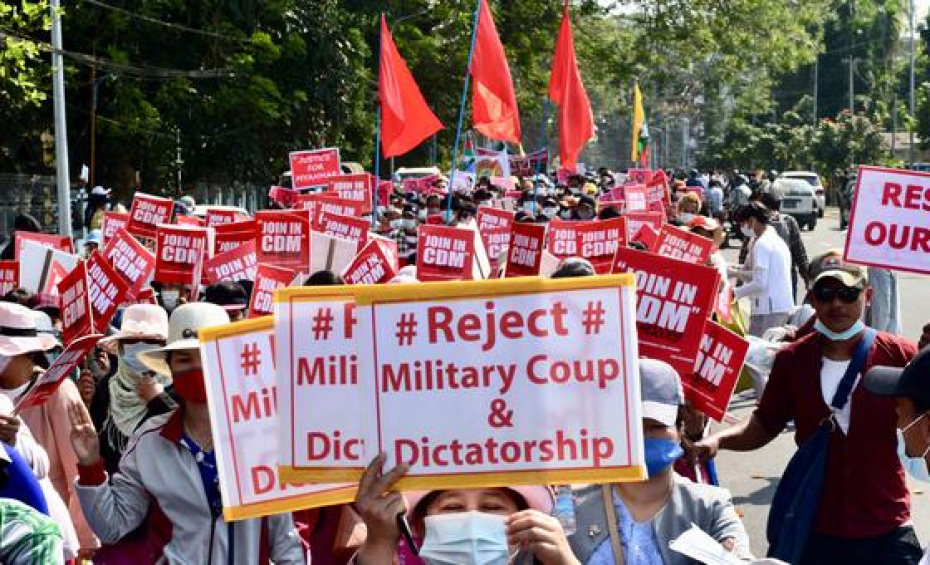Breadcrumb

Deny legitimacy of Myanmar’s military junta, UN expert urges

The international community must promptly deny the legitimacy of Myanmar’s military junta, the UN-appointed independent expert on the situation of human rights in the country said briefing at UN Headquarters in New York on Tuesday, launching a critical report as the coup enters its third year on Wednesday.
The State Administration Council (SAC) is illegal and illegitimate, Special Rapporteur Thomas Andrews said at the launch, co-hosted by the democracy and electoral assistance body, International IDEA.
As Myanmar crisis enters third year, Special Envoy Heyzer urgently calls for international unity on humanitarian aid, stance on elections and civilian protection.
https://t.co/6ob9yHpyen https://t.co/ILOjQ9SwiB
United Nations in Myanmar
UNinMyanmar
January 31, 2023
He called on the international community to stand firm against military rule, create a coalition of Member States to enforce strong, coordinated sanctions, and support the democratic National Unity Government, which has a stronger claim to legitimacy.
“Two years ago, the military deposed a democratically elected government in an unconstitutional coup,” the Special Rapporteur said, presenting his new report Illegal and Illegitimate: Examining the Myanmar Military’s Claim as the Government of Myanmar and the International Response.
“The unrelenting violence that it unleashed on the people of Myanmar has created a widespread human rights, humanitarian, and economic crisis and galvanized nationwide opposition.”
Sanctions, aid sorely needed
The conclusion is clear, he said, “the SAC’s military coup was illegal and its claim as Myanmar’s Government is illegitimate.” Indeed, a new, coordinated international response to the crisis is imperative” ahead of the “sham elections” being planned, he continued.
He urged all Member States, particularly those that have already imposed costs on the junta, to initiate a strategic approach to strengthen, coordinate and enforce economic sanctions and an arms embargo on the SAC and provide more robust humanitarian aid to the millions in desperate need.”
At the launch, International IDEA presented its latest policy paper Elections at a crossing point: Considerations for electoral design in post-coup Myanmar.
It outlines key areas to consider for genuine democratic elections in the emerging new constitutional context, including the overall electoral legal framework, voter registration, and electoral dispute resolution.
‘Devastating’ situation on ground
Other top UN officials had issued urgent calls, including the UN Secretary-General.
In an interview with UN News, the Secretary-General’s Special Envoy on Myanmar Noeleen Heyzer outlined the current situation on the ground. Citing recent reports, she said 17.5 million people require humanitarian aid in 2023, compared with 1 million before the takeover.
“The impacts on both the country and the people have been devastating,” she said. “The people on the ground are very clear that the humanitarian crisis is due to a political crisis.”
The World Bank reported that 40 per cent of the population lives under the poverty line, she said. In addition, 15.2 million people were currently food insecure and more than 34,000 civilian structures had been burned in the past two years.

Catastrophic human suffering
“It is a catastrophe in terms of human suffering, and this has regional and international implications,” the Special Envoy said.
Noting that the recent adoption of the Security Council resolution 2669 (2022) marked the first time the organ recognized Myanmar since its independence, she said it also reflected unprecedented international unity and support around extremely urgent issues.
Calls for urgent action
The Special Envoy called for greater unity and commitment among the international community in three key areas: scaling up aid efforts among partners; forging a unified position on possible elections and the implementation of civilian protection measures.
“It is inconceivable any form of peaceful and democratic transition can be initiated by those perpetrating harm on their own citizens,” she said. “The violence has to stop, including the aerial bombings and burning of civilian infrastructure along with military’s ongoing arrests of political leaders, civil society actors and journalists.”
